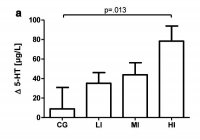Koveras
Member
- Joined
- Dec 17, 2015
- Messages
- 720
There is an fair amount of research regarding the influence of serotonin on fatigue during exercise which was interestingly not mentioned at all in the study below.
See:
Cerebral perturbations provoked by prolonged exercise. - PubMed - NCBI
Serotonin, Fatigue, Training, and Performance – Functional Performance Systems (FPS)
In the study at hand, the researchers assessed the effect of different intensities of aerobic exercise - represented as low (LI), moderate (MI), and high (HI) - on serum serotonin concentrations. The results are shown in the graph below.

I believe elsewhere on this forum cortisol, estrogen, endotoxin, histamine, prolactin, etc... elevations have been associated with exercise.
This is NOT by any means an attempt to say that exercise is "bad". But just another piece of information for those struggling with health issues to use in the context of their lives and make the best decisions for themselves and how to fit in appropriate amounts and intensity of activity.
From the study:
"Second, the literature reported an increased uptake of unbound tryptophan (precursor of 5-HT) at the BBB during exercise. It was discussed that enhanced lipolysis during exercise results in an increased compulsion of tryptophan from its plasma binding proteins (albumin) through free fatty acids (Weicker and Strüder 2001). More tryptophan may promote central biosynthesis and release of 5-HT (Patrick and Ames 2015; Wilson and Marsden 1996). Since 5-HT transporters (SERT) were described in mouse brain capillary endothelial cells at the BBB, increased 5-HT levels in the CNS might lead to augmented peripheral serum 5-HT levels as well. Wakayama et al. indicate that central 5-HT can cross the BBB through the SERT to obtain homeostasis with peripheral monoamine concentrations (Wakayama et al. 2002). According to this, several studies could show a significant positive correlation with serotonin levels in cerebral spinal fluid and blood plasma in both animals and humans (Audhya et al. 2012; Nakatani et al. 2008; Ohmatsu et al. 2014)."
"As mentioned in the introduction, it was shown that increased central 5-HT levels lead
to enhanced inhibitory control (Cools et al. 2008; Homberg et al. 2007) whereas reduced central 5-HT levels are associated with increased impulsivity. In line with these findings, the results of the correlation analysis suggest an association between serum 5-HT levels and the cognitive performance. Since this association is relatively weak, it should be kept in mind that several other factors are involved inthese processes (Lin and Kuo 2013). "
Given the fatigue research above, I'm not sure if "enhanced inhibitory control" doesn't relate more to "enhanced ability to sit around on one's ****" and similarly increased "impulsivity" to "having the energy to do things" rather the aforementioned "improved cognitive performance".
The effects of different aerobic exercise intensities on serum serotonin concentrations and their association with Stroop task performance: a randomized controlled trial
See:
Cerebral perturbations provoked by prolonged exercise. - PubMed - NCBI
Serotonin, Fatigue, Training, and Performance – Functional Performance Systems (FPS)
In the study at hand, the researchers assessed the effect of different intensities of aerobic exercise - represented as low (LI), moderate (MI), and high (HI) - on serum serotonin concentrations. The results are shown in the graph below.

I believe elsewhere on this forum cortisol, estrogen, endotoxin, histamine, prolactin, etc... elevations have been associated with exercise.
This is NOT by any means an attempt to say that exercise is "bad". But just another piece of information for those struggling with health issues to use in the context of their lives and make the best decisions for themselves and how to fit in appropriate amounts and intensity of activity.
From the study:
"Second, the literature reported an increased uptake of unbound tryptophan (precursor of 5-HT) at the BBB during exercise. It was discussed that enhanced lipolysis during exercise results in an increased compulsion of tryptophan from its plasma binding proteins (albumin) through free fatty acids (Weicker and Strüder 2001). More tryptophan may promote central biosynthesis and release of 5-HT (Patrick and Ames 2015; Wilson and Marsden 1996). Since 5-HT transporters (SERT) were described in mouse brain capillary endothelial cells at the BBB, increased 5-HT levels in the CNS might lead to augmented peripheral serum 5-HT levels as well. Wakayama et al. indicate that central 5-HT can cross the BBB through the SERT to obtain homeostasis with peripheral monoamine concentrations (Wakayama et al. 2002). According to this, several studies could show a significant positive correlation with serotonin levels in cerebral spinal fluid and blood plasma in both animals and humans (Audhya et al. 2012; Nakatani et al. 2008; Ohmatsu et al. 2014)."
"As mentioned in the introduction, it was shown that increased central 5-HT levels lead
to enhanced inhibitory control (Cools et al. 2008; Homberg et al. 2007) whereas reduced central 5-HT levels are associated with increased impulsivity. In line with these findings, the results of the correlation analysis suggest an association between serum 5-HT levels and the cognitive performance. Since this association is relatively weak, it should be kept in mind that several other factors are involved inthese processes (Lin and Kuo 2013). "
Given the fatigue research above, I'm not sure if "enhanced inhibitory control" doesn't relate more to "enhanced ability to sit around on one's ****" and similarly increased "impulsivity" to "having the energy to do things" rather the aforementioned "improved cognitive performance".
The effects of different aerobic exercise intensities on serum serotonin concentrations and their association with Stroop task performance: a randomized controlled trial
